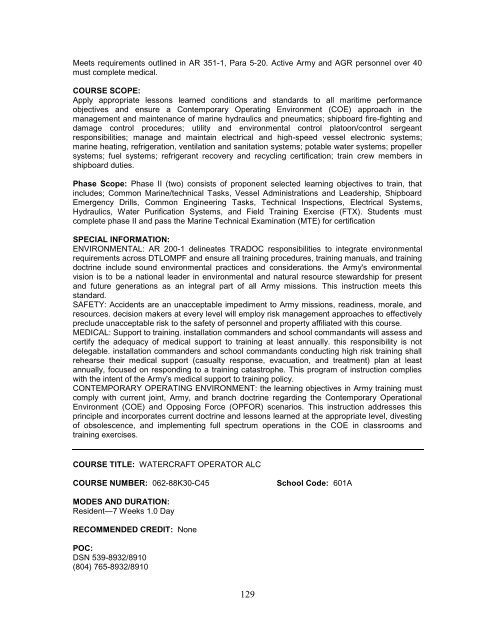FORWARD - Army Logistics University - U.S. Army
FORWARD - Army Logistics University - U.S. Army
FORWARD - Army Logistics University - U.S. Army
You also want an ePaper? Increase the reach of your titles
YUMPU automatically turns print PDFs into web optimized ePapers that Google loves.
Meets requirements outlined in AR 351-1, Para 5-20. Active <strong>Army</strong> and AGR personnel over 40<br />
must complete medical.<br />
COURSE SCOPE:<br />
Apply appropriate lessons learned conditions and standards to all maritime performance<br />
objectives and ensure a Contemporary Operating Environment (COE) approach in the<br />
management and maintenance of marine hydraulics and pneumatics; shipboard fire-fighting and<br />
damage control procedures; utility and environmental control platoon/control sergeant<br />
responsibilities; manage and maintain electrical and high-speed vessel electronic systems;<br />
marine heating, refrigeration, ventilation and sanitation systems; potable water systems; propeller<br />
systems; fuel systems; refrigerant recovery and recycling certification; train crew members in<br />
shipboard duties.<br />
Phase Scope: Phase II (two) consists of proponent selected learning objectives to train, that<br />
includes; Common Marine/technical Tasks, Vessel Administrations and Leadership, Shipboard<br />
Emergency Drills, Common Engineering Tasks, Technical Inspections, Electrical Systems,<br />
Hydraulics, Water Purification Systems, and Field Training Exercise (FTX). Students must<br />
complete phase II and pass the Marine Technical Examination (MTE) for certification<br />
SPECIAL INFORMATION:<br />
ENVIRONMENTAL: AR 200-1 delineates TRADOC responsibilities to integrate environmental<br />
requirements across DTLOMPF and ensure all training procedures, training manuals, and training<br />
doctrine include sound environmental practices and considerations. the <strong>Army</strong>'s environmental<br />
vision is to be a national leader in environmental and natural resource stewardship for present<br />
and future generations as an integral part of all <strong>Army</strong> missions. This instruction meets this<br />
standard.<br />
SAFETY: Accidents are an unacceptable impediment to <strong>Army</strong> missions, readiness, morale, and<br />
resources. decision makers at every level will employ risk management approaches to effectively<br />
preclude unacceptable risk to the safety of personnel and property affiliated with this course.<br />
MEDICAL: Support to training. installation commanders and school commandants will assess and<br />
certify the adequacy of medical support to training at least annually. this responsibility is not<br />
delegable. installation commanders and school commandants conducting high risk training shall<br />
rehearse their medical support (casualty response, evacuation, and treatment) plan at least<br />
annually, focused on responding to a training catastrophe. This program of instruction complies<br />
with the intent of the <strong>Army</strong>'s medical support to training policy.<br />
CONTEMPORARY OPERATING ENVIRONMENT: the learning objectives in <strong>Army</strong> training must<br />
comply with current joint, <strong>Army</strong>, and branch doctrine regarding the Contemporary Operational<br />
Environment (COE) and Opposing Force (OPFOR) scenarios. This instruction addresses this<br />
principle and incorporates current doctrine and lessons learned at the appropriate level, divesting<br />
of obsolescence, and implementing full spectrum operations in the COE in classrooms and<br />
training exercises.<br />
COURSE TITLE: WATERCRAFT OPERATOR ALC<br />
COURSE NUMBER: 062-88K30-C45 School Code: 601A<br />
MODES AND DURATION:<br />
Resident—7 Weeks 1.0 Day<br />
RECOMMENDED CREDIT: None<br />
POC:<br />
DSN 539-8932/8910<br />
(804) 765-8932/8910<br />
129



